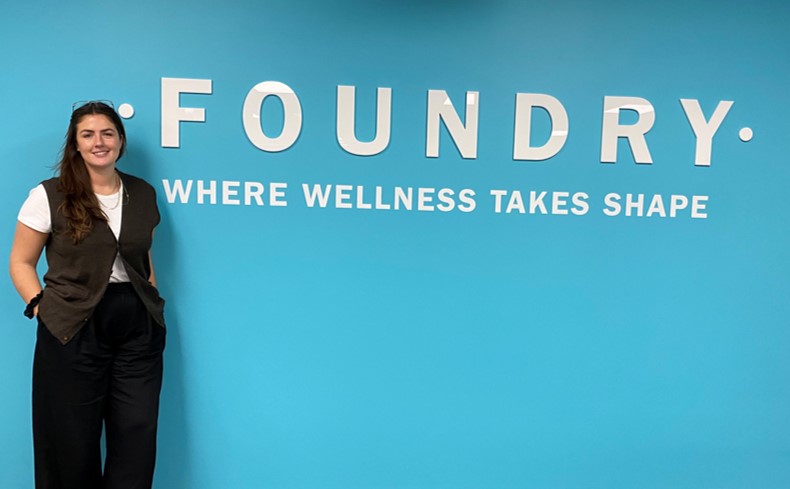
Dr. Christine Mulligan is a 2023 post-doctoral CIHR Health Systems Impact Fellow, and is supervised by Dr. Skye Barbic. Dr. Mulligan is conducting her research in collaboration with Foundry, a province-wide network of integrated health and wellness services for young people aged 12-24.
Her fellowship supports research projects that are embedded within healthcare providers and organizations (also known as health systems). This enables researchers to closely investigate the most pressing issues in the delivery of healthcare, provide evidence to help inform decision-making about potential solutions, and monitor the direct impact of the improvements on the health of individuals.
In collaboration with Foundry, Dr. Mulligan’s research ultimately aims to improve mental health support services for youth.
We sat down with Dr. Mulligan to learn more about her research and its impact.
What inspired you to pursue research in the field of youth and mental health?
I completed my doctoral training in Nutritional Sciences with a Specialization in Public Health Policy at the University of Toronto. The main goal of my research was to provide evidence to support the implementation of national nutrition policies promoting population health. For example, how to best protect children from the harmful health impacts of food marketing.
My research career so far has focused on one specific, albeit important, aspect of health – nutrition. While I’m still passionate about food (especially eating it), I found myself wanting to expand my knowledge and experience and contribute more broadly to addressing and impacting the social determinants of health and health systems that contribute to a young person’s wellness.


How did you hear about Dr. Barbic’s research with Foundry and why did you choose her as your supervisor for this fellowship?
I got connected to Skye [Barbic]’s work through Foundry when I was starting the process of applying for the Health Systems Impact Fellow (HSIF) program. Immediately upon partnering with Foundry, it was clear their values and goals mirrored my own, and I was excited about the opportunity to collaborate this organization. With Skye being the Head Scientist at Foundry as well as being appointed at UBC OSOT, it was a no-brainer to join her research team as a post-doc. Skye’s work, well, it speaks for itself! For me, working with Skye was kind of the best of both worlds. I get to do meaningful research within a super exciting organization, but also be supported by Skye, UBC and the community and resources that the university has to offer.
What kind of research will you be doing, and what types of impact do you think it will have?
This type of work is all new to me, which is really exciting, and I’ve been learning so much – new ways of conducting research, new ways of thinking, and new ways of implementing what we discover. On a personal level, this was one of the main reasons I was drawn to the HSIF program. My receipt of this fellowship is giving me the opportunity to broaden my training and jump into an entirely different field of research, while gaining professional experience and contributing to providing a tangible, real-world impact within Foundry, a health system organization.
The research I will be doing as part of the fellowship is focused on learning how Foundry can optimize how it cycles data into knowledge and then into practice, then back into data and so on – all with the goal of improving youth experiences with the health system, and most importantly, their health and wellness outcomes. The aim is for Foundry to continue to be an organization that is able to respond to the needs of youth, how and when they need it, and adapt as those needs change and evolve over time.
Can you tell us a bit more about your career goal(s) and how this fellowship might help you achieve them?
Whenever I get asked this question, I’m never sure how to answer, because there’s no specific “job” or “position” that comes to mind. What I can say is that I’ve always held a personal belief that health is a right, not a privilege, and that systems need to support wellness for all people, through upstream, prevention-focused, and equitable initiatives. I also recognize the importance of fostering health from a young age and have studied and witnessed the impact that the right support can have on a young person. Finding a career path that aligns with those values – that’s the goal.
Do you have any advice for anyone who might apply for this fellowship in the future?
Short answer – do it! In all seriousness though, this fellowship is such a unique opportunity to be able to do research in the “real world”, outside of the traditional academic realm, and become part of the change that so many of us hope to see in our health system. I would definitely recommend it to anyone who’s thinking about their next steps and wanting to try something new.
Images: OSOT, except for Mental Health Matters t-shirt image (Matthew Ball) and person looking out from balcony image (Ümit Bulut)